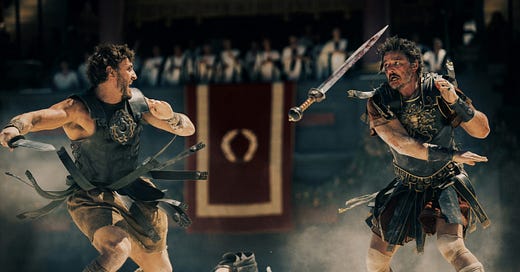'Gladiator II' Review
Directed by Ridley Scott. Starring Paul Mescal, Denzel Washington, Pedro Pascal, Connie Nielsen, Joseph Quinn
Gladiator II feels very much like a throwback. It stands out among the films of this year, feeling more like a film from the same era as The Lord of the Rings, Master and Commander, or indeed the original Gladiator itself. It is a grand epic narrative, of a mold that we rarely get to see in theaters these days. True, the spectacle of big blockbuster movies these days seems to be getting bigger and bigger (as do their budgets) but rarely do we see the sort of grand narrative and epic scope that really makes these movies interesting. Superhero movies are endlessly mocked for finales involving “giant sky beams”, but they continue using that trope because destruction of the physical world/universe/dimension is the only way they can attempt to inject true stakes or a sense of scope into their films.
Gladiator II (and the other aforementioned films from right around the turn of the millenium) realizes something that the unimaginative screenwriters of today don’t seem to get: complete world destruction is simply not that scary. What is truly scary is the thought that your culture, your way of life, your ideals will go extinct, but the world will keep on turning without them.
The main thematic conflict of Gladiator II is the conflict between the republican ideals that Rome represents, as personified by Marcus Aurelius and the martyred Maximus Decimus Meridius, and the reality of a Rome fully mired in decadence and lust for conquest, represented by the twin emperors Geta and Caracalla (Joseph Quinn and Fred Hechinger) and the freed-slave turned gladiator master Macrinus (Denzel Washington). Like this year’s Megalopolis (though, I must admit, much more watchable and competently made), Gladiator II seeks to be a fable, using classical imagery to evoke a lament for the state of our own civilization - and the means by which we can take it back.
It evokes the same themes as Frank Capra’s enduring masterpiece Mr. Smith Goes to Washington: the pitting of a nation’s founding ideals and promise against the reality that power corrupts, and corruptio optimi pessima. General Acacius (Pedro Pascal) fills the Jefferson Smith role here: a true servant of Rome, he fights for the empire but longs for a republic. Married to Marcus Aurelius’ daughter Lucilla (Connie Nielsen, one of the few returning cast members from the original), Acacius plots with her to overthrow the tyrannical emperors and return power in Rome to the Senate, going back to the ideals which made Rome great in the first place and which (he believes) can make Rome great again.
Acasius’ foil is Macrinus, the former slave. Macrinus despises Rome, both in ideal and reality. He sees the dreams of Acasius as false promises, and the reality of Rome as a fetid pool of corruption. His solution is to burn it all down: Rome must fall, there is nothing good to be saved. His machinations behind the scenes and his bitter hatred for all the Aurelians is what drives most of the plot of the film, and what brings our actual protagonist into prominance.
This protagonist is Hanno (Paul Mescal), a Numidian captive forced into the role of the titular Gladiator. Hanno is fueled by rage against Rome for the conquest of his people and the deaths of his loved ones, and seems like the perfect vessel for Macrinus to use for the destruction of the empire. However, as he comes into contact with some of the disciples of Marcus Aurelius, there is hope that he might also embrace the ideal of Rome and help it triumph over the corrupt reality. As I wish to keep this review spoiler-free, that is all I will say here about Hanno, but his struggle truly is the heart and soul of the film, what personalizes the abstract forces director Ridley Scott is playing with here. The character of Hanno (and the other characters in the film) is where Gladiator II truly outshines Megalopolis: whereas the characters of Megalopolis felt like walking archetypes, robots meant to convey grand ideas, the characters of Gladiator II feel like real people wrestling with those grand ideas, humanizing the film greatly and making it feel more like a story and less like a conversation with your Great Books professor.
Gladiator II is the sort of epic film that I wish we still regularly made: epic in scope, in story, and in theme. It thrills and captures the audience’s attention and emotion while leaving them with something to wrestle with as they leave the theater. It is excellently crafted, well-written and well-executed. I highly recommend that a mature Catholic check it out and hopefully appreciate what seems like a throwback to an earlier and better age of filmmaking. Whether it signals a Renaissance of that sort of film or is a last gasp from an aging auteur remains to be seen. I hope and pray that it is the former.






This is a great review - ties classic philosophical anthropology in so well for this Denzel Washington fan. Thank you so much!!!!